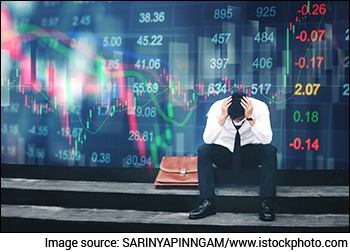India's Third Giant Leap
This Could be One of the Biggest Opportunities for Investors
- Home
- Views On News
- Sep 19, 2022 - Dealing with Trading Losses
Dealing with Trading Losses

Years ago, I saw a mixed martial arts film. The hero lost a tournament and undergoes the usual depressive phase after a loss.
He tells his friend - "They teach you everything that's needed to win. But nothing about how to cope with defeat."
This is true for everything in life. Trainers and students alike focus on winning and succeeding.
But we can't win all the time. Coping with failure must be a part of the learning process.
Trading is passive combat. Instead of guns and bullets we use computers and keyboards. Traders feel on top of the world after a winning trade. They deserve to, after all they won from millions of fellow traders with equal opportunities.
They boast to their friends, they promise holidays to their families and eat an extra roti for dinner that night. The world couldn't be any better.
But nobody talks about losses. A trader tends to internalize it. He takes it personally, grieves over it and depending on the magnitude of the loss, may even shun trading for periods of time or maybe forever.
Yet trading losses are a given. The world's premier trading championship - Robbins Cup trading championship provides us with a wealth of statistical data on trading and traders.
Their finding on the "hit rate" of traders is revealing. World championship level traders seldom have success rates of over 60%. Which means they take losses on 4 out of 10 trades initiated.
Regular traders take losses on 50% of all trades. Run of the mill traders have win rates of 35%. Their finding suggests that a success rate of less 30% means the trader was not cut out for trading.
As the old wall street saying goes - "A trading profit is the most difficult easy money you will ever make."
Nowhere is it more evident than in Europe. Did you know that online brokers are required by law to disclose the win rate of their clients? Did you know that the win rate is not over 20% for almost all European brokerage firms irrespective of their turnover size and client base?
How does an industry that has a failure rate of ~ 80% survive year after year? Not only survive but thrive?
The secret lies in how you cope with losses. There are two things to be borne in mind when dealing with losses.
Ideally losses should be smaller than profits. That is the easy part. Once in a while a big whale of a loss can and does hit a trader. Then it becomes critical that the trader not internalize his loss and focus on healing himself so he can get back in the game soon enough.
We traders are brain warriors who win or lose with our ideas. We are at our most vulnerable after big ticket gains and losses. Gains bring a feeling of invincibility and losses bring vulnerability. Both are counter productive.
Depending on the mindset of the traders and his tenacity, a trader may need anything between minutes to days before his mind is calm and he is trading rationally again.
Needless to say the shorter is the turnaround time required by the trader, the faster he bounces back from losses.
Experience is an irreplaceable aspect of turning around after a big loss. If you have been in the game long enough, you have seen losses frequently. Coping with them comes naturally to an experienced trader.
Also, with experience your turn around time also reduces. A trader tends to bounce back faster and harder.
I have been trading since 1986. I have suffered my share of the losses. The dotcom bust of 2000 almost took me to the brink of bankruptcy. For the next four years I lacked the courage to sit in front of trading terminal to day trade.
I healed slowly and returned back to the market. The global financial crisis of 2008 actually saw me get profitable. The difference was - experience.
I am living proof that a trader can bounce back from crippling trading losses. It takes time, effort and a great deal of emotional capital in addition to financial capital.
It won't be easy. If trading profits are difficult to garner, imagine how much more difficult it will be to recoup from losses. But it is do-able.
Have a profitable day.
Disclaimer: This article is for information purposes only. It is not a stock recommendation and should not be treated as such. Learn more about our recommendation services here...

Vijay L Bhambwani is a professional trader, author, trading mentor, and lifelong student of the markets. He has been an active trader since 1986. Financial markets are his life and passion. Everything else in his life revolves around his main objective - trading. He is the author of "A Traders Guide to Indian Commodity Markets".


Equitymaster requests your view! Post a comment on "Dealing with Trading Losses". Click here!
Comments are moderated by Equitymaster, in accordance with the Terms of Use, and may not appear
on this article until they have been reviewed and deemed appropriate for posting.
In the meantime, you may want to share this article with your friends!